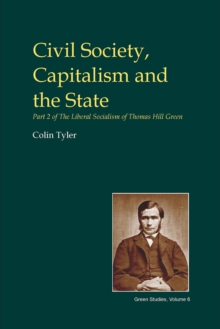
The Puritan' Democracy of Thomas Hill Green : With Some Unpublished Writings PDF
by Alberto de Sanctis
Part of the British Idealist Studies 3: Green series
Description
The central concern of this book is to demonstrate how Puritanism was a theme which ran through all Green's biography and political philosophy.
It thereby reveals how Green's connections with Evangelicalism and his known affinities with religious dissent came from his way of conceiving Puritanism.
In Green's eyes, its anti-formalist viewpoint made Puritanism the most suitable tool for avoiding the drawbacks of democracy.
The key objective of the book is to illustrate how the philosophy elaborated by Green aimed to encapsulate the best of Puritanism whilst eschewing the dangerous abstractions of both Puritan philosophy and German idealism.
It follows that Green's conception of positive and negative freedom, and his vision of political obligation, stemmed from his effort to revive the Puritan heritage rather than from an ambiguous flirtation with idealism.
The book purports to show how the influence of Puritanism in Green's political thought is an element which can help to integrate the literature in the area, contributing to a better comprehension of a philosopher who, despite being unanimously considered as the founder of the so-called Oxford idealist school, had a very difficult and sometimes obscure connection with idealism.
It has been widely argued that Green's relationship with idealism seemed to be infected by a religious germ which, because it was unrelated to German idealism, gave it a bad taste.
This study aims to encourage further investigation into the nature and propagation of that germ in the British idealist School.
Information
-
Download - Immediately Available
- Format:PDF
- Pages:225 pages
- Publisher:Andrews UK
- Publication Date:15/12/2016
- Category:
- ISBN:9781845406943
Other Formats
- EPUB from £15.74
Information
-
Download - Immediately Available
- Format:PDF
- Pages:225 pages
- Publisher:Andrews UK
- Publication Date:15/12/2016
- Category:
- ISBN:9781845406943










